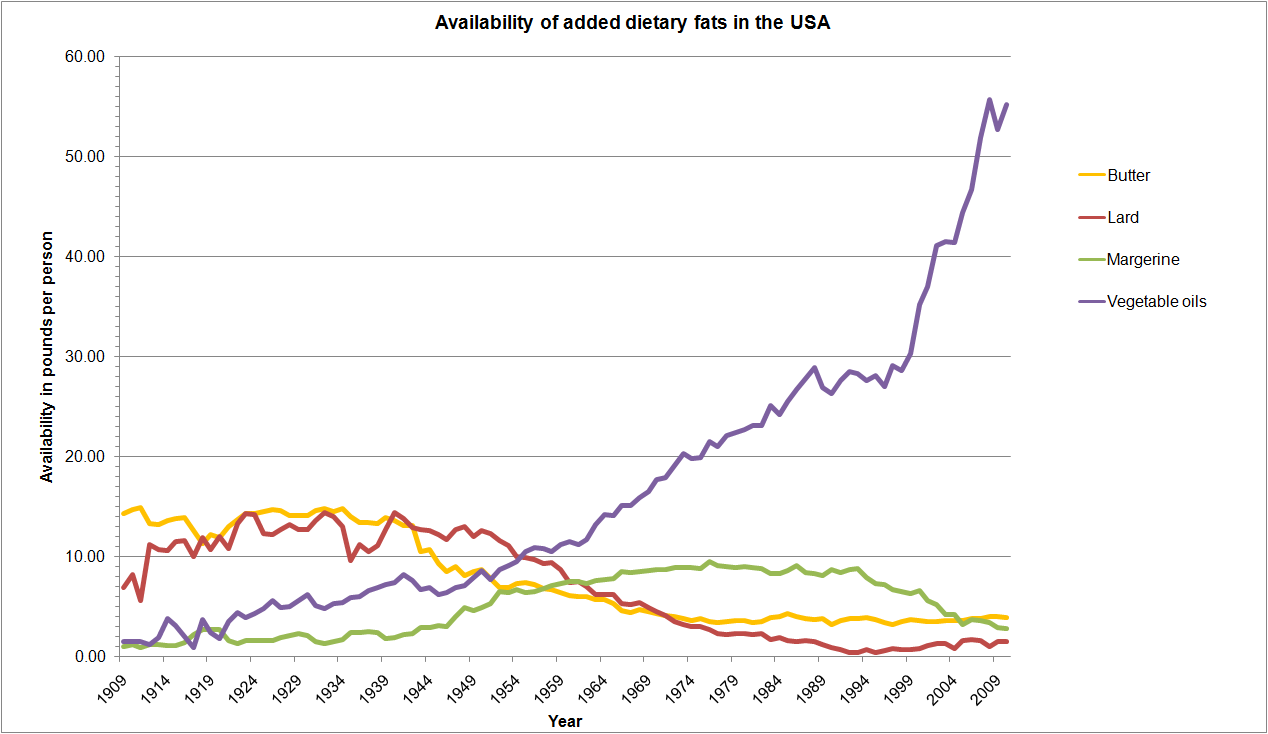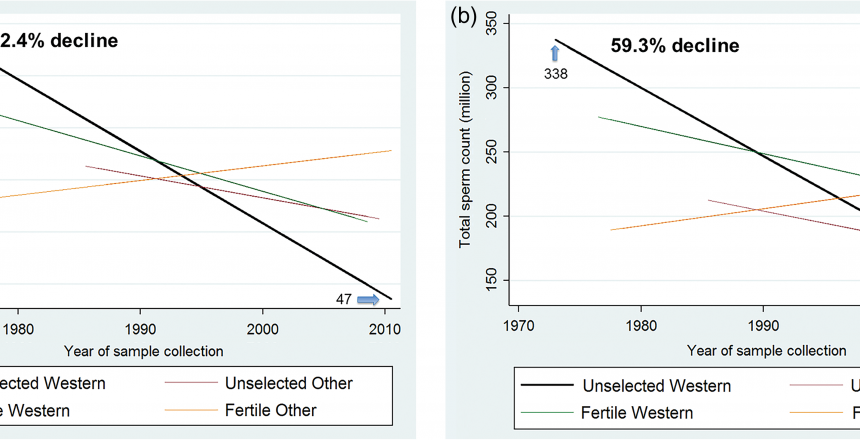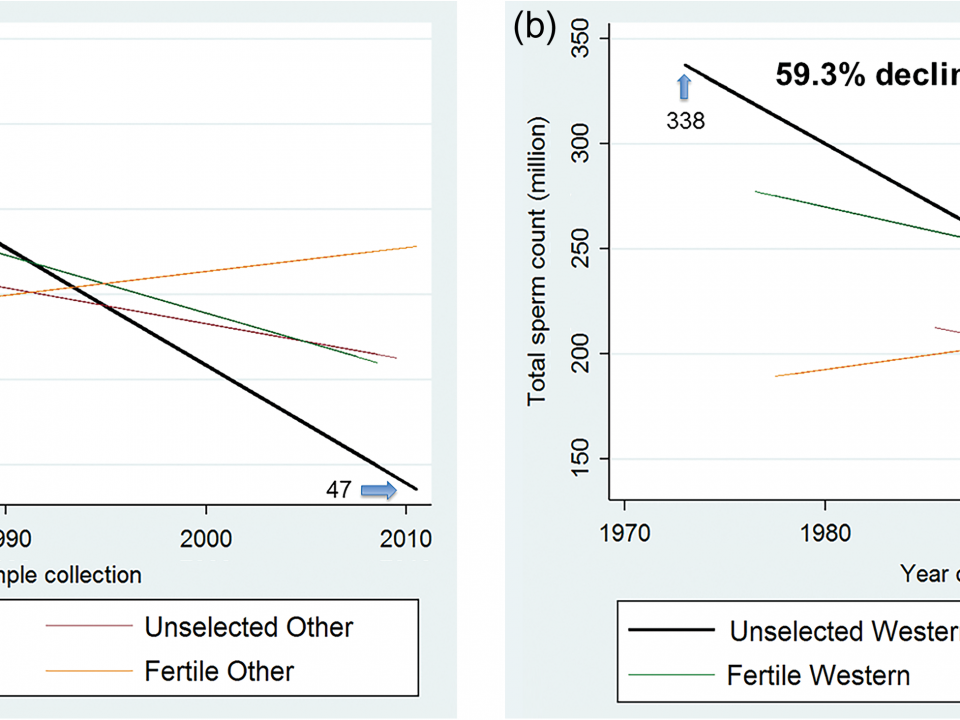We recently discussed how industrial seed oils, better known as vegetable oils, are dangerous to health and should as much as possible be eliminated from the diet of anyone who wants to stay healthy. For men, another danger of vegetable oils is that they promote low sperm counts and infertility.
Sperm counts are declining
It was recently reported that, in North America, Europe, Australia and New Zealand, sperm counts have declined nearly 60% in about the last 40 years, between 1973 and 2011.
In contrast, no decline in sperm counts was seen in South America, Asia, and Africa, although far fewer studies have been performed in these regions.
The decline in sperm counts parallels the secular decline in testosterone.

To say that a 60% decline in sperm counts in the Western world is alarming is an understatement. Most European men may already be subfertile. Unless something is done about it, we could see a number of scenarios, such as (in the extreme case) extinction of Western peoples, or perhaps a return to a highly polygamous society in which fertile men take many wives and the infertile men get none, which in turn leads to a civilizational downgrade or perhaps revolution.
Why are sperm counts declining? There could be a number of reasons.
Obesity might be one reason, although scientists who have studied the secular decline in testosterone believe that obesity can’t account for (all of) it.
Estrogens in the water supply might be another: since the advent of the birth control pill, water has become full of estrogens due to their excretion from women taking them.
Another reason might be diet, which has changed greatly in the Western world over the past several decades.
One of the foodstuffs whose ingestion has massively increased is vegetable oil.
How vegetable oil impacts male fertility
Vegetable oil contains high amounts of omega-6 fatty acids, and their use in processed food means that people who eat it, as well as those who use vegetable oils for cooking at home, ingest large amounts of it. While small amounts of omega-6 fats are required for health, the amount ingested in the Western world may be 15 to 50 times higher than needed, leading to a very unbalanced omega-6/3 ratio.
To understand why ingestion of large amounts of omega-6 fats is so unhealthy, we need to understand the phenomenon of competition among fatty acids.
Proteins, which make up much of the body’s structure, are made using a fixed, invariant ratio and sequence of amino acids. While it’s possible to get inadequate dietary protein, it isn’t possible to alter the structure of the body’s own proteins.
Polyunsaturated fatty acids, most prominently the omega-6 and omega-3 fatty acids, are also structural, and form important components of cell membranes (phospholipids), as well as cell signaling molecules such as prostaglandins and thromboxanes.
In contrast to proteins, the dietary mix (ratio) of fatty acids determines the kind of fatty acids that are incorporated into cell membranes and cell signaling molecules. Therefore a higher intake of omega-6 fatty acids results in a higher concentration of them in cells.
So, in the past several decades, omega-6 fatty acids became incorporated into the cells of Western men (and women) to a much greater extent than before.
Men who were infertile due to a low sperm count had more than double the omega-6/3 ratio in blood and in spermatozoa as men who were fertile and normal.
Infertile men also had lower absolute levels of omega-3 fatty acids.
There was a strong negative correlation between omega-6/3 ratios in individual men and sperm count, sperm motility, and sperm morphology.
Other studies have found similar results.
Of course, correlation isn’t causation. But in rats, an increasing ratio of dietary omega-6/3 fatty acids leads to lower sperm counts, density, motility, and higher deformity.
A toxic byproduct of omega-6 fatty acids, 4-hydroxynonenal, increases reactive oxygen species and damages human spermatozoa. The authors of this study suggest, ” If such spermatozoa successfully fertilize the egg, then this may explain the rise in lymphoma and leukemia in children of smoking fathers.”
Infertile men were given omega-3 supplements in the form of fish oil, at ~2 grams omega-3 daily, or a placebo. Sperm count and density significantly and substantially (about 50%) increased in the omega-3 group.
The omega-6/3 ratio “is of utmost importance in male in maintaining normal sperm integrity and function.” Many studies bear this out.
Is the decline in sperm counts in the West due to increased vegetable oil consumption?
Vegetable oil intake has increased massively
Check out the following chart, which shows the availability of added dietary fat in the U.S.

Vegetable oil consumption has increased massively. Soybean oil alone supplies 20% of calories to the median U.S. diet. That means about 9% of calories are pure omega-6 fatty acids (linoleic acid).
Vegetable oil consumption parallels the decline in sperm counts.
Why has consumption increased so much? Mainly, because they told us to use it.
Who’s they? Our “health” authorities, including in the medical and scientific establishments and the U.S. government.
They told us to use a wholly unnatural, highly processed oil instead of mother nature’s butter and olive oil. Health establishment fail.
What men can do to maintain high fertility
Vegetable oils, aka industrial seed oils, are used in processed, fast, and junk food of all kinds. If you eat at a fast food joint, your fries are cooked in them. At a Mexican joint, your tortilla chips. At a fancy restaurant (or at home), your salad is doused with them.
Virtually any kind of processed or packaged food you get at a supermarket contains vegetable oil.
The first step in maintaining high fertility is to avoid vegetable oils as much as possible. If added fat is desired, use butter, lard, coconut oil, ghee, or olive oil.
We’ve seen above that omega-3 supplementation can improve fertility, and it does this by decreasing the omega-6/3 ratio. Therefore, decreasing the amount of omega-6 fatty acids alone may be enough to maintain and/or improve fertility. That being said, a decent fish oil supplement can be of value in male fertility.
Conclusion
As with so many other areas in health, the mainstream health advice with regard to the type of fats everyone should eat have turned out to be disastrous for male fertility.
The advice emanating from the medical and scientific establishment and the government has helped to bring on the obesity and diabetes epidemics as well. They want virtually everyone on statins, which lower testosterone.
They used to laugh about “precious bodily fluids”, but the phrase turned out to be eerily prescient.
Don’t trust anything they say.










27 Comments
PD Thanks for this presentation of the facts. I agree entirely with your conclusions. Industrial oils are a ‘new’ item in our food and so should be treated cautiously.
There was a time when I was swayed by dietary guidelines, I eliminated butter and used margarine & vegetable made from industrial oils . But those days are long past. In recent years it has been butter & olive oil exclusively.
I am intrigued by the huge rise in vegetable oil over the past 50 years in the chart. I suspect that this has more to do with the increased purchases of fried & deep fried foods and such from KFC, Mac Donalds, Burger King etc. Cheap ‘fast food’ is the sector that has grown hugely in the last 50 years in Oz as well as the USA.
And coconut oil which my lady loves to cook with.
I have been cooking with coconut oil or olive oil for a long time now. Good stuff. I am going to pick up some lard at the local butcher’s shop and try that.
Spot on. There is also the hidden risk in soy of being GMO and sprayed with roundup poison as many as 4 times. Rats fed either gmo soy or roundup had reproductive issues and increased cancer. See Serralini’s paper and others too. So it may not just be the seed oil itself but the added poisons or genetic issues within where more than 90 percent of soy is GMO. Avoiding it is not simple, have to make your own meals from organic, avoid fried food at restaurants, avoid all processed food, sugar and refined carbs.
Roundup is also on the dirty list as a well known endocrine disruptor, and the amount sprayed on GMO crops is nothing short of criminal:
https://www.ncbi.nlm.nih.gov/pubmed/23820267
In fact, what we are seeing (IMO) is the synergestic result of multiple causes. When you combine the effects of highly processed vegetables oils, obesity, pesticides (and RoundUp in particular) you get this 60% drop in male fertility. Sad, indeed….
P.D What’s your take on monounsaturated fats?
I realize humans require small amounts of two kinds of polyunsaturated fats from dietary sources. More than that daily requirement (7% of total calories) is unnecessary. But nobody (even the FDA, bless their little ‘study’ obsessed hearts) seems to have a bad word for monounsaturated fat In fact I couldn’t even find a cautionary note about it – at any level.
Apparently the body even manufactures it from saturated fat.
Olive oil has a fair amount of monounsaturates, but also quite a lot of polyunsaturates.
Macadamia oil, on the other hand, has hardly any polyunsaturates (1-2%) between 70% and 85% mono’s , and the rest saturated. Also it has a much higher ‘smoke point” than even coconut oil – olive oil or butter being perhaps the WORST fats to cook with, though in the case of butter, certainly the most delicious.
Why do you think monounsaturated fats are considered above any reproach , even by the naysayers of both saturated and polyunsaturated fat ?
Monounsaturated fat is healthy, as is saturated. It’s the polyunsaturated that you have to beware of, since, as I wrote, they are incorporated into cell structures and signaling molecules. Monounsaturated and saturated fats are mostly either burned for energy or stored.
Veggie Oil, Soy, Endocrine disruptors in practically everything we use day in and out. No wonder this rate dropped so significantly in western countries. Modernity makes men effeminate so thanks for shedding light on these things! Book coming on that topic as well? It would probably read like fiction because things got so absurd.
Thanks, Titus – I should write a book about all this, none in the works yet though.
Flax seeds seem to be another good way besides fish oil – flax seeds seem to provide the highest amount of omega-3s available, and cheaply at that.
Eat a few grams of those a day and you can easily bring that omega-6/3-ratio well down.
Make sure you buy closed (non-ground) seeds and do chew them very well, so they open up, otherwise
they will pass the digestive tract intact and not release the oil.
Do not buy the liquid linseed oil or non-intact/non-closed flax seeds – the oil is so reactive to oxygen that it spoils
in a very short time and becomes toxic – affinity of linseed oil to oxygen is actually so great that it is a mild
pyrophoric, meaning being auto-ignitable in air.
By chewing the seeds up in your mouth you make sure the oil has practically no contact with air before it is
absorbed in the body.
If you want to be perfect, buy non-Canadian flax seeds (from EU or other Americas), for the Canadian one
is known to contain dangerous levels of cadmium due to the Canadian soil and the flax plant absorbing this metal from it.
This may be an especially useful supplement for those who are not willing to give up the tasty omega-6-containing cheap and sweet crap foods altogether – just also eat five grams or so of flaxseeds with your cake, and the damage done to your health will at least be somewhat contained.
I have to correct my given information here:
Flax is still an excellent source of omega-3s – but Mr. Mangan recently posted data in his twitter account detailing the estrogenic activity of foodstuffs – and flax turns out to be so extreme that even smaller quantities, like those one would eat to help one’s omega-3 intake (a few grams a day) are not appearing harmless in terms of its effect of the endocrine system.
https://twitter.com/Mangan150/status/913161346878906368
It seems avoiding flax, minimizing omega-6s and taking fish oil is best.
Camelina oil is a 35 percent rich omega-3 oil grown in Russia and Canada. It contains vitamin E and it can substitute fish oils very well.the omega 3 and omega 6 ratio is 2:1.very good oi’ for reducing chlorestrol and triglicrides levels in the blood. Excellent salad oil.cold pressed oil should be consumed one table spoon everyday in empty stomach to reduce the chlorestrol levels.clinical tests are conducted in siberian Academy of sciences. Any questions please write to solars69@gmail.com. -chakrapani
Good topic. Got converted from seed oils after noticing TOXIC OILS by David Gallespie in my local library. Much of my bad health in the past was explained, esp regarding injury and inflammation. He later did a very good series like this topic, “How Vegetable Oils are Stealing our Future.”
Very interesting note about Israel in that,
“With a measured rate of sperm count decline approximately twice that of any other Western country, experts are predicting that by 2030, average Jewish Israeli sperm counts will drop to a level where reproduction is likely to be impossible.
…
Israel is the highest consumer of omega-6 fats in the world.”
https://davidgillespie.org/how-vegetable-oils-are-stealing-our-future-part-one/
The chosen people need to realise why God wanted the most fatty bits of the animal sacrificed to him. 😉
Another tidbit of note…Vegetable (seed) oils are often promoted for their LDL Cholesterol-lowering ability, however as Dr. Cate Shanahan and others have described, what they actually do is change the cholesterol so that it is not picked up in tests as cholesterol. Whether one thinks LDL is inherently harmful or not (I don’t), what the oils produce after they have changed the LDL is apparently clearly harmful, so that is yet another strike against them.
Very interesting, I did not know that.
She goes into it in great detail in her speech at Low Carb Vail (or maybe breckenridge?) from last year which is available as a free podcast and I think is on Youtube also.
It seems that there are two considerations when buying a vegetable oil. The primary consideration is the ratio of omega 6 to omega 3 fats, i.e., the ratio should be as close to 1:1 as possible. The secondary consideration is how the oil is obtained, with expeller/cold pressed the best, and with an industrial/chemical process to be assiduously avoided. For example, olive oil has a ratio of Omega 6 to Omega 3 of 11:1, and it is usually advertised as cold pressed. So olive oil is considered to be good. Coconut and Palm oils are also considered to be good oils. Is there any other consideration that should be weighed in choosing a vegetable oil? And how do we weigh all these factors?
Hi Conan – you’re right, both of those are considerations, but to my mind the omega-6 content outweighs the other. You mention that olive oil is 11:1 omega-6 to 3, but what’s missing from that analysis is that olive oil is only about 10% polyunsaturated fat. It’s 73% monounsaturated, 14% saturated. Compare that to corn oil at 55% polyunsaturated with a 6/3 ratio of about 50:1. So even if a seed oil was cold- or expeller-pressed or however they make it, I would refrain from using it. I saw a cold-pressed safflower oil the other day for instance. I wouldn’t use that.
Other considerations: extra virgin olive oil is better than other kinds; also, there’s a great deal of fraud in the olive oil industry, with vegetable oils mixed with olive oil and the whole mix passed off as EVOO, so buyer beware. Also, it should go without saying, beware of hydrogenation. I’ve seen palm oils sold that way; the lard in my local supermarket is hydrogenated.
Years ago I had an Italian lady friend from Naples. We went shopping together and she bought Australian certified virgin organic olive oil instead of Italian virgin olive oil… at 3 times the price ! I asked her why. She said with a scathing look at me that the olive oil industry in Italy was totally corrupted by hidden additions of cheap vegetable oil…And that the olive oil sold in Italy was mostly grown on trees in North Africa
Now I buy Australian extra virgin olive oil.
We’re getting quite a bit of local olive oil now here in California, so it’s probably worthwhile for me to buy it for that same reason.
There’s a book named “Extra Virginity” by Tom Mueller that explains a lot about the state of olive oil in today’s markets and kitchens. A few of the main points he made:
– Light degrades olive oil, so if a bottle is clear, not dark, that means the company selling it doesn’t really care about the qualifyt of the olive oil it’s selling.
– Only buy a bottle that has a harvest date, and try to get it within a year from when you see it on the shelf. Expiration dates are meaningless since they can choose any length of time they want.
– He agreed that unless you absolutely know the background of the olive oil you are buying, stay away from Italian brands. Most of the olives are from other countries, and a lot of the “extra virgin” oils are cut with soy and other vegetable oils.
– A good rule of thumb for us in the U.S. is to buy Californian, as it is probably fresher and less likely to contain other oils.
Mueller also has a blog where he gives his opinions on various olive oils from around the world and in your markets.
Are you still offering online coaching?
Yes, I replied to your email a few days ago.
Hi PD,
As a longtime female lurker of Rogue, I am extremely grateful for your interesting, applicable articles and the energy-enhancing changes they have produced within my life.
Any thoughts on subbing with avocado oil? I have recently started using an avocado oil mayonnaise endorsed by a popular paleo lifestyle blog. Love the stuff, although it’s a bit expensive. Thanks.
Hi Janette, thanks for saying that, it’s much appreciated. Avocado oil is low in polyunsaturated fat, about 13%, putting it in the same league as olive oil. So you’re safe with avocado oil mayonnaise, provided you don’t eat it by the spoonful out of the jar (something the marathon runner Bill Rogers used to do).